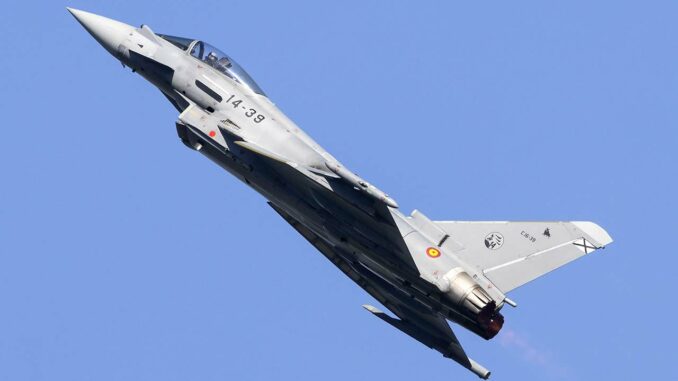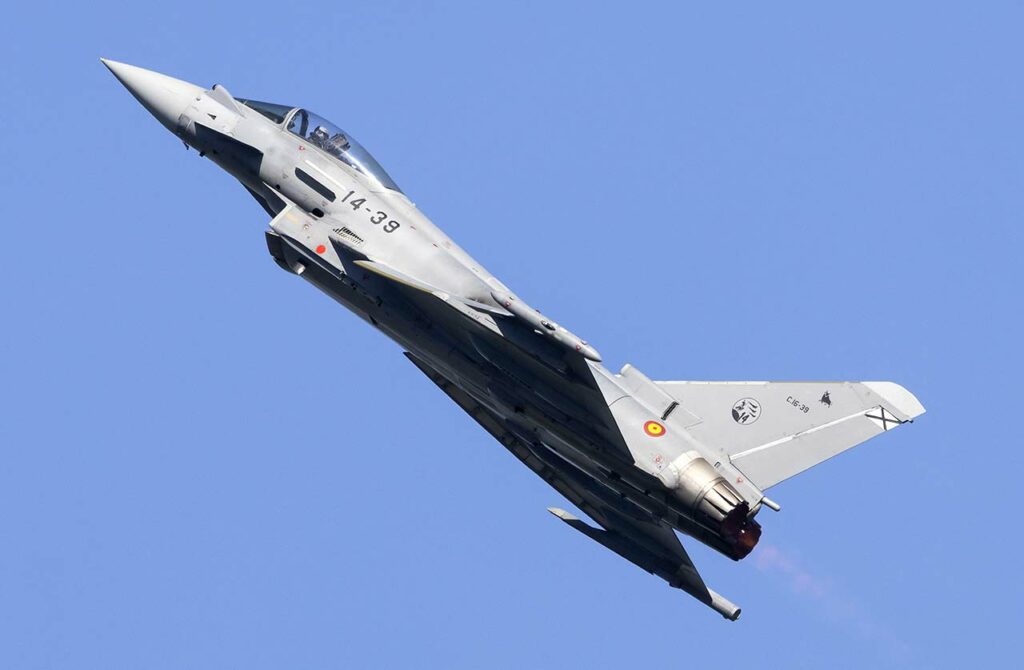
Germany gives in on the sale of 48 Eurofighter jets to Saudi Arabia after its key role in intercepting missiles aimed at Israel.
Change of course: Germany approves sale of Eurofighter to Saudi Arabia
Germany has changed its arms sales policy, lifting its objection to the sale of 48 Eurofighter Typhoon fighter jets to Saudi Arabia. This change of heart comes in the wake of the kingdom’s involvement in the interception of Houthi missiles aimed at Israel. German Chancellor Olaf Scholz and Foreign Minister Annalena Baerbock confirmed the decision, initially reported by the dpa news agency.
Saudi Arabia, which already has a fleet of over 70 Eurofighters, has been instrumental in using these aircraft to intercept Houthi missiles and drones. Germany, as co-producer of the Eurofighters with the UK, Spain and Italy, had veto power over sales to countries outside the core user group.
The policy of the German coalition government, comprising the Social Democrats, the Greens and the Liberal Democrats, had previously prohibited arms sales to parties involved in the civil war in Yemen. Saudi Arabia, which supports the Yemeni government against the Houthi rebels, who are aligned with Hamas against Israel, was directly concerned by this blockade, which was also motivated by human rights violations committed by Riyadh.
This about-turn by the German government, supported in particular by Baerbock during his visit to Israel, is seen as a response to Saudi Arabia’s constructive engagement in preventing the escalation of the conflict between Israel and Hamas.
Defense analysts such as Dan Darling of Forecast International and Richard Aboulafia of AeroDynamic Advisory point to the influence of British pressure and a new political realism in Berlin, following Russia’s invasion of Ukraine, as key factors in this shift.

Implications and repercussions of Germany’s Eurofighter sale to Saudi Arabia
Germany’s decision to approve the sale of Eurofighter jets to Saudi Arabia has significant regional and global implications. On the one hand, it marks a significant shift in Germany’s foreign and defense policy, towards greater pragmatism in the face of current geopolitical realities.
This decision strengthens the military capabilities of Saudi Arabia, a key player in the Middle East region, and could influence the balance of power in the area. It also signals an implicit recognition of Saudi Arabia’s role in defending Israel against Houthi attacks, potentially realigning alliances and perceptions in the region.
Internally, the decision is provoking mixed reactions in Germany, particularly from the Green Party, a partner in the government coalition, which has traditionally opposed arms sales to conflict regions. This decision could lead to tensions within the government coalition, and raise questions about Germany’s commitment to human rights and ethical standards in the arms trade.
From an industrial point of view, this approval is a boost for the Eurofighter consortium, comprising Airbus, BAE Systems and Leonardo. It could not only reinvigorate Germany’s aerospace defense sector, but also open up new export opportunities for the consortium.
The German decision could also have an impact on the dynamics of arms sales in Europe and worldwide. It could prompt other European countries to re-evaluate their own arms export policies in a context of increasing competition and changing strategic requirements. This could lead to increased arms sales in sensitive regions, raising ethical and security concerns.
In geopolitical terms, this decision could be perceived as an escalation in the arming of regional players and intensify the arms race in the Middle East. It could also affect relations between European countries and other world powers, such as the USA and Russia, in their approach to arms sales and diplomacy in the region.
The lifting of the German blockade on the sale of Eurofighter to Saudi Arabia reflects a significant shift in Germany’s defense and arms export policy, underlining a balance between ethical considerations and strategic imperatives. This decision has wide-ranging repercussions, affecting regional dynamics, international alliances and the global arms market, while raising crucial questions about the future of German foreign policy.
War Wings Daily is an independant magazine.